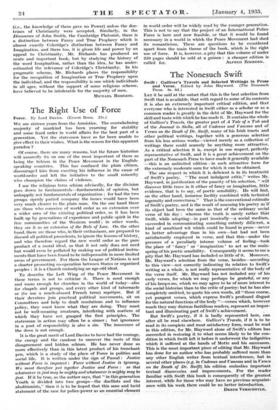The Right Use of Force
WE are sixteen years from the Armistice. The overwhelming majority of mankind has been yearning for stability and some fixed order in world affairs for the best part of a generation. Yet the statesmen have so far been unable to give effect to their wishes. What is the reason for this apparent paradox ?
Of course, there arc many reasons, but the future historian will assuredly fix on one of the most important of them as being the Schism in the Peace Movement in the English- speaking countries. This has confused the plain citizen, discouraged him from exerting his influence in the cause of world=order and left the initiative to the small minority who champion the claims of violence.
I use the religious term schism advisedly, for the division goes down to fundamentals—fundamentals of opinion, but unhappily not fundamentals of organization ; for had the two groups openly parted company the issues would have been very much clearer to the plain man. On the one hand there are those who conceive of world order as an extension over a wider area of the existing political order, as it has been built up by generations of experience and public spirit in the free communities of the Western world ; in other words, they see it as an extension of the Rule of Law. On the other hand, there are those who, in their enthusiasm, are prepared to discard all political precedents, to ignore the lessons of history, and who therefore regard the new world order as the pure product of a moral ideal, so that it not only does not need but would even be polluted by making use of political instru- ments that have been found to be indispensable in more limited areas of government. For them the League of Nations is not a charter promoting co-operation between States or organized peoples : it is a Church embodying an age-old ideal.
To describe the Left Wing of the Peace Movement in these terms is not to criticize it. There is need enough and room enough for churches in the world of today—also for chapels and groups, and every other kind of tabernacle or (to use a much-abused French term) mystique. But if their devotees join practical political movements, sit on Committees and help to draft resolutions and to influence policy, they must know what they are doing. They must not be well-meaning amateurs, interfering with matters of which they have not grasped the first principles. The statesman in action may often be a sinner ; but ignorance in a post of responsibility is also a sin. The innocence of the dove is not enough.
It is the great merit of Lord Davies to have had the courage, the energy and the candour to uncover the roots of this disagreement and hidden schism. He has never done so more effectively than in this latest product of his trenchant pen, which is a study of the place of Force in politics and social life. It is written under the sign of Pascal : Justice without gorce is impotent : Force without Justice is tyranny. We must therefore put together Justice and Force : so that whatsoever is just may be mighty and whatsoever is mighty may be just. If it be true, as the author says, that " in this generation Youth is divided into two groups—the duellists and the abolitionists," then it is to be hoped that this sane and lucid statement of the case for police-power as an essential element in world order will be widely read by the younger generation. This is not to say that the project of an International Police Force is here and now feasible, or that it would be found necessary in a world in which the Peace Movement had shed its romanticism. These are questions to be considered apart from the main theme of the book, which is the right use of force. It is, however, a pity.that this volume of under 250 pages should be sold at a guinea : a cheaper edition is






































 Previous page
Previous page